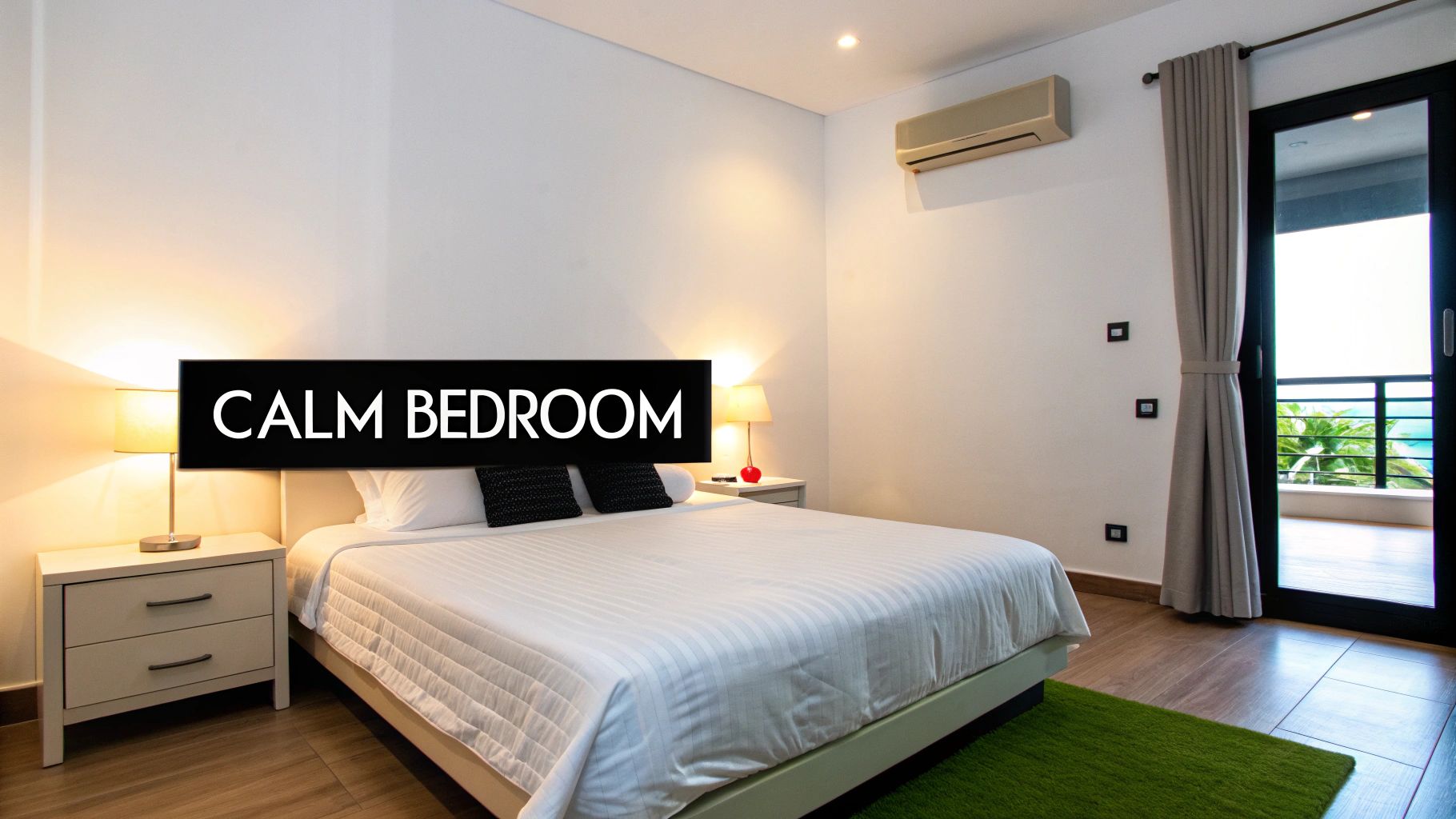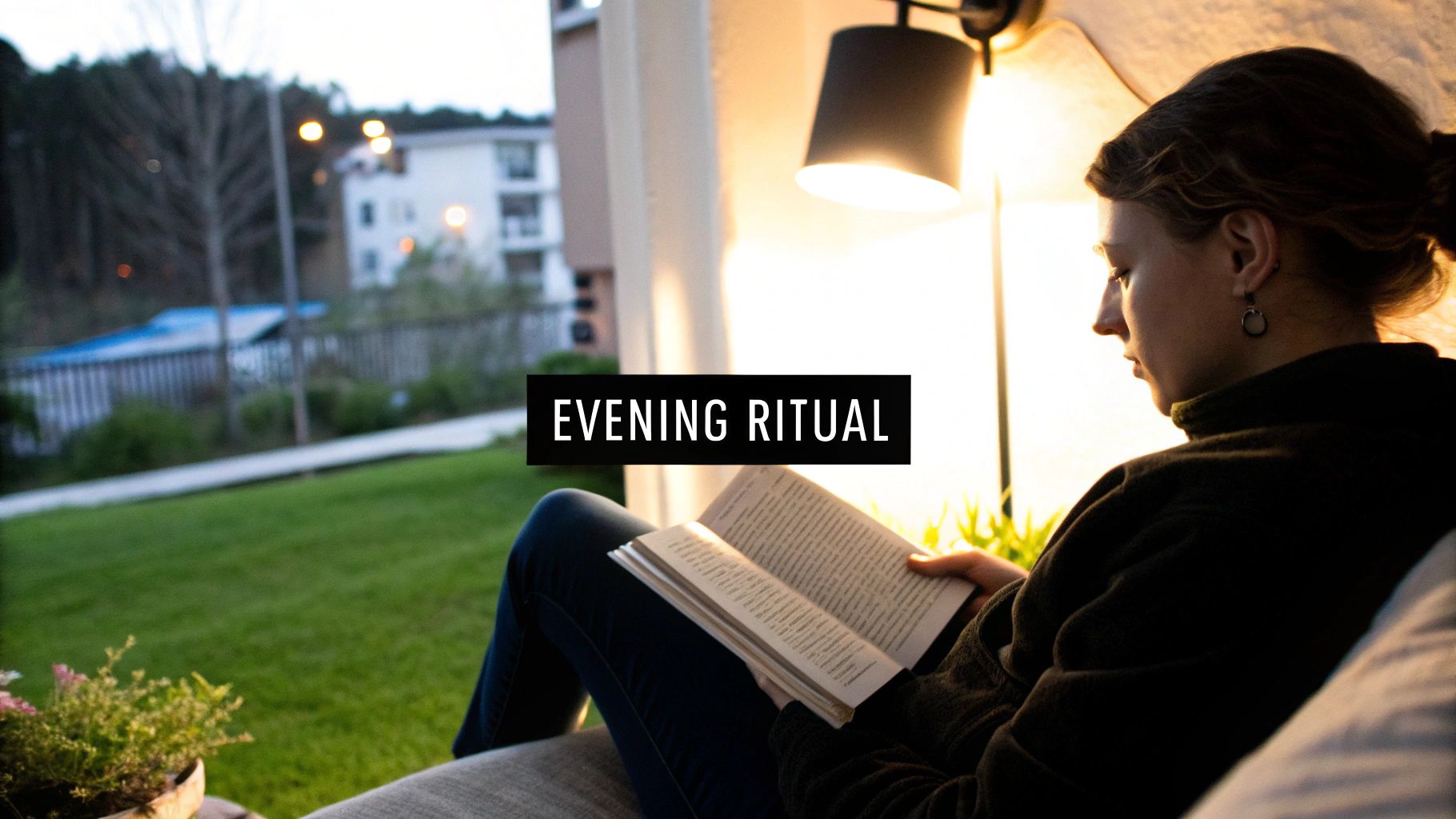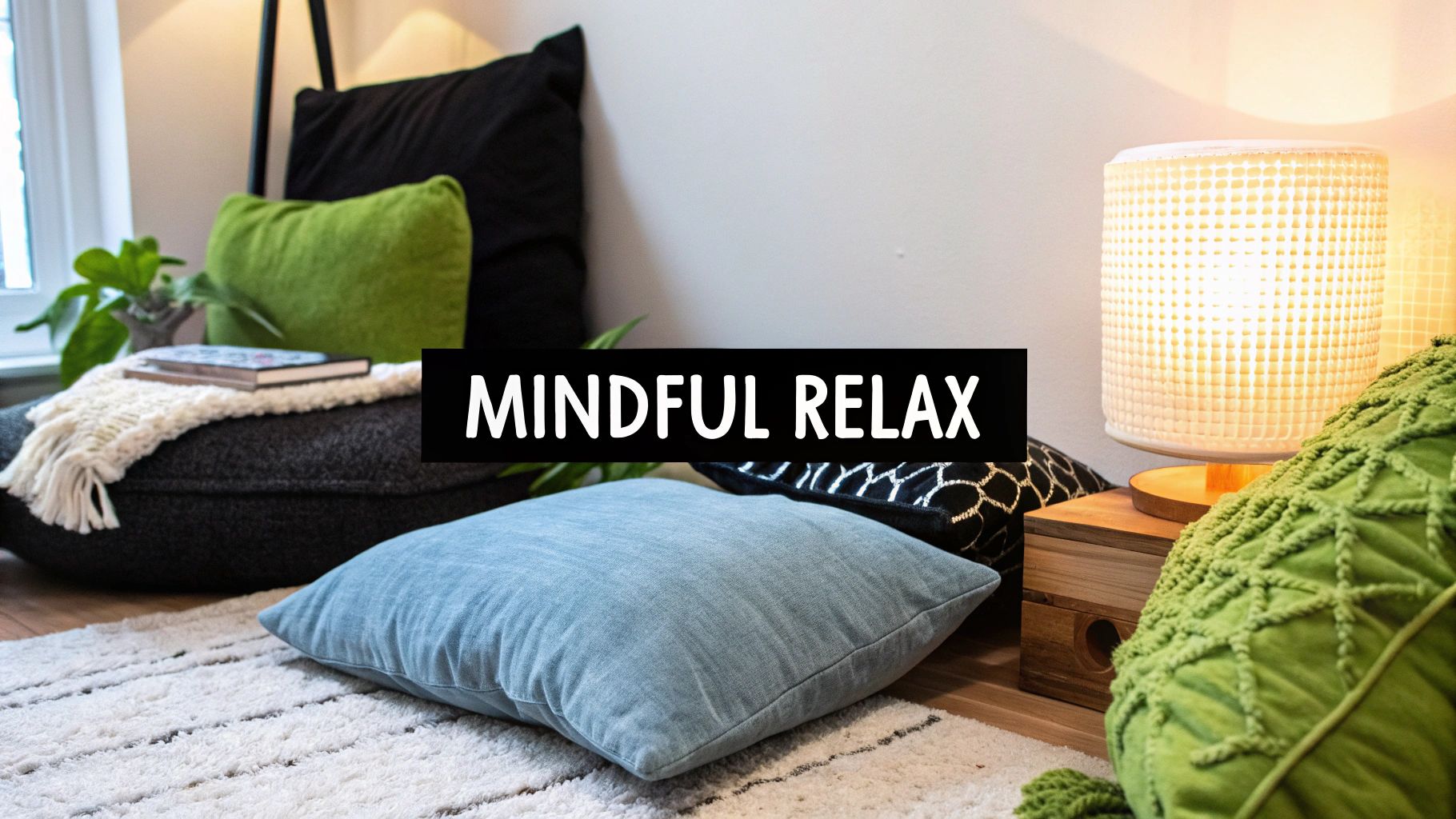
How to Improve Sleep Quality: 7 Proven Tips
The UK Sleep Crisis: Why We're More Exhausted Than Ever

The UK is facing a sleep deprivation epidemic. This widespread issue impacts our health, wellbeing, and productivity. Many individuals are not getting enough sleep, and the quality of sleep is often poor. This poses a significant public health challenge that requires attention.
The Alarming Decline in Sleep Duration
One of the most concerning signs of this crisis is the decrease in average sleep duration. Data reveals a worrying trend of insufficient sleep among Brits. Studies show that average sleep duration has fallen below seven hours for many, significantly less than the recommended 7.5 to 8.5 hours for adults.
This sleep deficit has wide-ranging consequences. It affects not only our daily energy levels but also our long-term health and wellbeing. This leads to the equally important issue of declining sleep quality.
Not Just Quantity, But Quality
It's not enough to just lie in bed; the sleep we get must be restorative. However, more and more people in the UK are reporting poor sleep quality. This has a significant impact on physical and mental health, as well as productivity at work and in daily life.
To illustrate this decline, let's look at some recent data. The following table presents a snapshot of UK sleep trends over time, highlighting the concerning decline in sleep health.
UK Sleep Trends Over Time
| Year | Average Hours | % Reporting Good Sleep | Notable Impacts |
|---|---|---|---|
| 2021 | 6.19 | Not Available | Baseline Data |
| 2022 | 6.11 | Not Available | Slight Decrease in Average Sleep |
| 2023 | 5.91 | 36% | Significant Drop in Both Average Sleep and Reported Quality |
As the table shows, the average Brit now sleeps only 5.91 hours per night. This is down from 6.11 hours in 2022 and 6.19 hours in 2021. Only 36% of people surveyed reported getting 'good' quality sleep in 2023. Furthermore, the negative impact of poor sleep on emotional wellbeing was more pronounced in women (55%) than in men (41%). This data underscores the growing need for initiatives to promote better sleep hygiene, particularly within workplaces and public health programs. Nuffield Health's 2023 'Healthier Nation Index' offers a deeper dive into these statistics.
This downward trend in sleep quality is likely connected to various factors, such as increased stress levels, lifestyle changes, and disruptions to our sleep environment. Addressing these underlying causes is critical to improving the nation's sleep health.
The Impact on Wellbeing
The effects of poor sleep are substantial and far-reaching. Chronic sleep deprivation weakens the immune system, increasing the risk of chronic diseases. It also impairs cognitive functions, affecting concentration, memory, and decision-making.
Beyond physical health, poor sleep significantly impacts mental health. It can contribute to heightened stress, anxiety, and even depression. This sleep crisis is not just about feeling tired; it represents a decline in overall wellbeing. Effective strategies for improving sleep quality are crucial for both individual and national health.
Transforming Your Bedroom Into a Sleep Sanctuary
Your bedroom should be your personal retreat, a place designed for rest and rejuvenation. Creating a sleep-promoting environment is key to improving your overall sleep quality. Consider these important factors when designing your sleep sanctuary.
Temperature Control
Maintaining the right temperature is crucial for quality sleep. The ideal bedroom temperature falls between 16-18°C. This range helps facilitate the body's natural cooling process, essential for falling asleep and staying asleep. Temperatures outside this comfortable range can disrupt sleep cycles, leading to restlessness and less restorative sleep.
Darkness Optimization
Light exposure, particularly at night, can disrupt your circadian rhythm, your body's internal clock. Minimizing light in your bedroom is essential for melatonin production. Melatonin is a hormone that regulates sleep. Specialized blackout blinds are highly effective, but simpler solutions like darker curtains or an eye mask can also significantly improve sleep quality. These are especially helpful in urban areas with high levels of light pollution.
Tactile Comfort
Just like Goldilocks, your mattress and bedding shouldn't be too hard or too soft, but just right. Choosing the correct mattress firmness depends on your preferred sleeping position. Side sleepers often benefit from a softer mattress to cushion pressure points, while back sleepers might prefer a firmer surface for proper spinal alignment. Bedding materials also play a vital role. Natural, breathable fabrics like cotton or linen help regulate temperature and moisture, preventing overheating and contributing to a more comfortable night's sleep. You might be interested in: How to master...
Noise Reduction
Noise pollution can significantly impact sleep quality. If outside noise from traffic or neighbors is a problem, consider using earplugs or a white noise machine. These simple solutions can create a more peaceful sleep environment by minimizing disruptions.
By addressing these four key elements – temperature, light, comfort, and noise – you can transform your bedroom into a haven for sleep. This dedicated space will support your body’s natural sleep mechanisms and promote truly restful sleep. Many individuals experience insufficient sleep, often averaging less than six hours per night. Investing in these changes can significantly improve your sleep quality, contributing to better overall health and well-being.
Your Sleep-Promoting Evening Ritual Blueprint

Creating a consistent evening routine significantly improves sleep quality. It's not just about a set bedtime; it's about training your body to wind down. This works with your circadian biology, the internal process regulating your sleep-wake cycle.
The Power of Predictability
Your evening routine is like a lullaby for your brain. A regular routine signals to your body that it's time to prepare for sleep, just like a soothing song signals bedtime to a child. This predictability helps your body naturally produce melatonin, the sleep-regulating hormone. Dimming the lights an hour before bed, for example, can trigger melatonin production.
Designing Your Personalized Wind-Down Routine
Evening routines are personal. The key is finding what works for you and maintaining consistency. However, some activities are known to promote sleep.
- Gentle Movement: Light stretching or yoga can release physical tension.
- Warm Bath or Shower: A warm bath causes a rise and fall in body temperature, similar to the natural temperature drop before sleep.
- Reading: Reading a physical book (not a screen) can calm your mind.
Maintaining a regular sleep schedule, even on weekends, reinforces your body’s natural sleep-wake cycle. Sticking to a regular bedtime and wake-up time, even when tempted to deviate, can significantly improve your sleep. Poor sleep has economic implications, costing the UK economy an estimated £37 billion annually in 2022, with 74% of UK adults reporting a decline in sleep quality. Learn more about UK sleep statistics. This highlights the importance of prioritizing sleep.
Avoiding Sleep Saboteurs
Just as some activities promote sleep, others hinder it. These "sleep saboteurs" disrupt your sleep architecture—the pattern of deep and REM sleep crucial for feeling rested.
- Late-Night Screen Time: Blue light from electronic devices suppresses melatonin production.
- Large Meals Before Bed: Digesting a heavy meal before bed can disrupt sleep.
- Caffeine and Alcohol: While alcohol might initially induce drowsiness, it disrupts sleep later. Caffeine can interfere with sleep onset and duration.
These habits disrupt sleep stages, affecting how rested you feel. Replacing these habits with sleep-promoting activities is key to better sleep. Creating a consistent evening ritual helps you take control of your sleep and wake up feeling refreshed. This consistency is essential for optimizing sleep.
Digital Detox For Deeper Sleep: Beyond Screen Time
Our always-connected world impacts our sleep. Technology, while useful, can disrupt sleep quality. This goes beyond the effects of blue light, encompassing the psychological stimulation that keeps our minds active even after we've put our devices away.
The Science Behind The Screen
The blue light emitted from devices suppresses melatonin, a hormone regulating sleep. Melatonin acts as the body's natural sleep trigger. Blue light interferes with this, making it harder to fall asleep and stay asleep. The constant information flow and social engagement from our devices also keep our minds alert, hindering good sleep.
Setting Boundaries With Technology
Improving sleep involves setting boundaries with technology. This doesn't mean a complete digital detox, but being mindful of device usage.
- Implement a "Digital Curfew": Stop using electronic devices at least an hour before bed to allow your brain to wind down.
- Optimize Device Settings: Use "night mode" settings to reduce blue light emission and mitigate some negative effects.
- Create a Tech-Free Zone in Your Bedroom: Remove devices from your bedroom to cultivate a relaxing sleep environment.
If you habitually scroll through social media before bed, replace this with a relaxing activity like reading a physical book or listening to calming music.
Breaking The Bedtime Scrolling Habit
Many use devices to unwind before bed, but this can be counterproductive. Scrolling through social media or checking work emails can increase anxiety and make it harder to fall asleep. These activities stimulate the brain, making it difficult to transition into sleep. You might be interested in: How to master...
Finding Alternative Activities
To break free from bedtime scrolling, try these relaxing alternatives:
- Mindfulness Meditation: A few minutes of mindfulness can calm racing thoughts.
- Gentle Stretching: Releasing physical tension can ease mental stress.
- Journaling: Writing down your thoughts can help clear your mind.
By understanding technology's impact on sleep and implementing these strategies, you can improve your sleep quality. These strategies, combined with other healthy sleep habits, can help you achieve the recommended 7.5 to 8.5 hours of sleep.
Eat and Drink Your Way to Better Sleep Quality

The connection between what you eat and how well you sleep goes deeper than simply avoiding caffeine before hitting the hay. Specific nutrients can have a direct impact on your brain's sleep-regulating processes, influencing sleep quality. This means tweaking your diet can be a surprisingly effective way to improve your sleep.
The Nutrients Behind Sleep
Some nutrients act as building blocks for compounds that promote sleep. For example, tryptophan, an amino acid found in foods like turkey and milk, is essential for producing serotonin and melatonin. Serotonin is a neurotransmitter important for mood regulation, and it also helps prepare the body for sleep. Melatonin is the hormone that directly regulates your sleep-wake cycle.
Foods That Help or Hinder Sleep
Certain foods can sabotage a good night’s rest, even if you eat them hours before bed. Foods high in saturated fat and sugar can disrupt sleep architecture, meaning you get less deep, restorative sleep. This can leave you feeling tired and sluggish, even after a full night’s sleep. Large meals eaten close to bedtime can also interfere with falling asleep due to digestive discomfort.
On the flip side, certain foods and beverages can encourage better sleep. Kiwis, for example, are rich in antioxidants and serotonin, both of which may improve sleep quality. A small study showed that eating two kiwis an hour before bed for four weeks improved sleep onset, duration, and efficiency. A glass of warm milk before bed can also be beneficial thanks to its tryptophan content.
The Importance of Hydration
Staying properly hydrated is key for uninterrupted sleep. Dehydration can lead to nighttime awakenings from a dry mouth or muscle cramps. Drinking enough fluids throughout the day, especially in the hours leading up to bedtime, can prevent these sleep disruptions. However, avoid drinking large amounts of liquid right before bed to minimize nighttime bathroom trips.
You might be interested in: How to master...
Practical Tips For Eating and Drinking Your Way to Better Sleep
To help illustrate the connection between food, beverages, and sleep, take a look at this comparison table:
To help you make more informed choices about your diet and its impact on your sleep, the following table summarizes key foods and beverages and their effects:
| Food/Beverage | Effect on Sleep | Mechanism | Timing Recommendations |
|---|---|---|---|
| Chamomile Tea | Promotes Sleep | Calming effect | 30-60 minutes before bed |
| Almonds | Promotes Sleep | Source of melatonin and magnesium | As a snack a few hours before bed |
| Fatty, Greasy Foods | Disrupts Sleep | Difficult to digest | Avoid close to bedtime |
| Caffeinated Drinks | Disrupts Sleep | Stimulant | Avoid after lunchtime |
| Alcohol | Initially induces drowsiness, then disrupts sleep | Interferes with sleep cycles | Avoid close to bedtime |
By understanding the link between your diet and your sleep, you can start making smarter choices that support better sleep quality. These changes, combined with a consistent evening routine and a sleep-friendly bedroom environment, can significantly improve your sleep, making it more restful and restorative.
Movement Matters: Exercise Your Way to Better Sleep

Physical activity and sleep quality are closely connected. Understanding this connection is key to improving your sleep. This goes beyond simply hitting the gym. It involves understanding how different types of movement, their timing, and intensity can all impact your sleep.
How Exercise Impacts Sleep Architecture
Exercise can have a positive effect on sleep architecture, which refers to the various stages of sleep your body cycles through each night. Moderate-intensity aerobic exercise, such as brisk walking or cycling, can increase the amount of deep sleep you get. Deep sleep is vital for physical restoration and waking up feeling refreshed.
A 2010 study in the Journal of Clinical Sleep Medicine showed that participants who regularly engaged in aerobic exercise experienced a noticeable increase in deep sleep. This demonstrates that even moderate exercise can significantly improve the restorative quality of your sleep. This is a critical factor in enhancing overall sleep quality.
Regular physical activity can also help regulate your circadian rhythm, your body's natural internal clock. This, in turn, can improve your sleep-wake cycle, making it easier to fall asleep and wake up at consistent times. Consistency is a fundamental building block for healthy sleep.
Timing Your Workouts for Optimal Sleep
When you exercise is important. Morning workouts are ideal for some, promoting alertness and establishing a positive daily rhythm. This can contribute to more restful sleep later on. However, exercising too close to bedtime can interfere with sleep.
This is because exercise can raise your body temperature and trigger the release of hormones that promote wakefulness. Finding the best time to exercise for better sleep depends on your individual chronotype, which is your natural sleep-wake preference. Experiment to discover what works best for you.
If evening workouts leave you feeling energized, for example, try shifting your exercise routine to the morning or afternoon.
Intensity Levels and Sleep
While exercise is generally beneficial for sleep, the intensity of your workout does play a role. High-intensity exercise close to bedtime can be disruptive. However, for some, gentle evening yoga or stretching can be relaxing and promote better sleep.
Adapting your exercise routine to your individual needs is essential for maximizing sleep benefits. Even light activities like chair yoga or short walks can be helpful for those with limited mobility. The key is to incorporate movement consistently into your daily routine to improve your sleep quality.
Remember, consistency is more effective than occasional intense workouts when it comes to sustained sleep improvement. This is essential for establishing good sleep habits.
Post-Exercise Routines for Better Sleep
What you do after your workout is also important. Allowing sufficient time for your body to cool down and relax before bed is crucial. A warm bath or shower after exercise can be particularly helpful in promoting relaxation. This is because the rise and subsequent fall in body temperature mimics the natural temperature drop that occurs before sleep.
This emphasizes the importance of understanding how exercise fits into your overall sleep improvement strategy. By incorporating exercise consistently into your routine, and by tailoring the type, timing, and intensity to your individual needs, you can harness its powerful sleep-enhancing benefits.
When Sleep Problems Need Professional Attention
While lifestyle changes can significantly improve sleep quality for many, persistent sleep problems sometimes indicate underlying medical conditions requiring professional help. Knowing when to seek assistance is crucial for effectively addressing these issues.
Recognizing The Signs of Sleep Disorders
Occasional difficulty falling asleep or staying asleep is normal. However, persistent problems impacting your daily life may indicate a sleep disorder. Some common sleep disorders include sleep apnea, characterized by pauses in breathing during sleep; insomnia, the inability to fall or stay asleep; restless legs syndrome (RLS), an overwhelming urge to move your legs; and circadian rhythm disorders, disruptions to the body's natural sleep-wake cycle.
For example, consistently waking up unrefreshed despite seemingly adequate sleep may indicate sleep apnea. Loud snoring, gasping for air during sleep, and excessive daytime sleepiness are also common symptoms. Similarly, persistent difficulty falling asleep, staying asleep, or waking up too early, coupled with daytime fatigue, could point to insomnia. This can significantly impact your quality of life and necessitates professional attention.
Experiencing an irresistible urge to move your legs, especially at night, accompanied by uncomfortable sensations, could suggest restless legs syndrome. If your sleep-wake cycle is significantly out of sync with the regular day-night cycle, causing difficulty falling asleep and waking up at appropriate times, you may have a circadian rhythm disorder.
Navigating The UK Healthcare System For Sleep Concerns
If you suspect a sleep disorder, consult your GP first. They can assess your symptoms and refer you to a sleep specialist if needed. Within the NHS, sleep disorder assessments typically involve reviewing your medical history, a physical examination, and potentially a sleep study. Sleep studies, conducted at home or in a sleep clinic, monitor various physiological parameters during sleep to identify abnormalities. Treatments offered through the NHS range from lifestyle advice and cognitive behavioral therapy for insomnia (CBT-I) to CPAP machines for sleep apnea.
Access to specialized sleep services within the NHS can sometimes involve waiting lists. Private healthcare provides quicker access to consultations and diagnostic testing but has associated costs. Carefully weigh the pros and cons of both options when deciding on your course of action. Statistical data from the UK highlights the prevalence of sleep disorders. An estimated 37% of adults experience insomnia, while approximately 2.5 million individuals live with obstructive sleep apnoea hypopnoea syndrome (OSAHS). These disorders often go undiagnosed, with 85% of OSAHS sufferers undiagnosed. Find more detailed statistics here.
Digital Therapeutics For Sleep Improvement
Digital therapeutics, including apps and online programs, are increasingly used to manage sleep disorders. These tools offer personalized support and guidance for improving sleep hygiene, practicing relaxation techniques, and tracking sleep patterns. They provide a convenient and accessible complement to traditional treatments.
Seeking professional guidance is essential for addressing persistent sleep problems. By understanding the signs of sleep disorders and navigating the UK healthcare system, you can begin improving your sleep and overall well-being.
Ready to take control of your sleep and enhance your well-being? DadFix Reboot, our flagship supplement, is scientifically formulated with vitamins, minerals, adaptogens, nootropics, and antioxidants to help manage stress, improve mental clarity, and optimize physical performance, including sleep quality. Try DadFix Reboot today and experience the difference! Visit DadFix
Article created using Outrank
